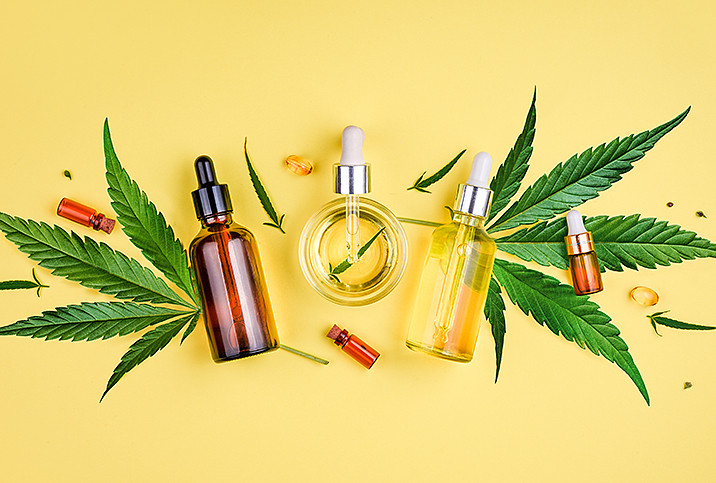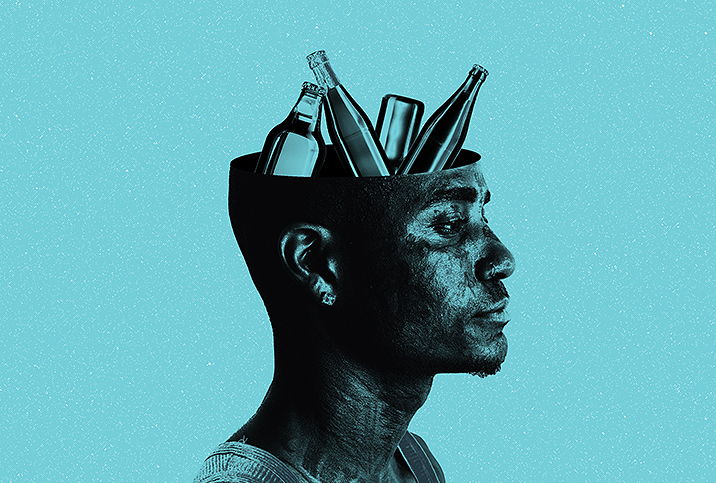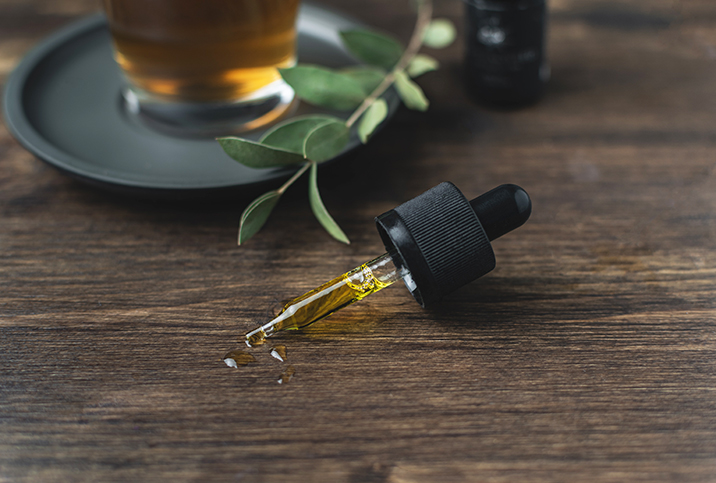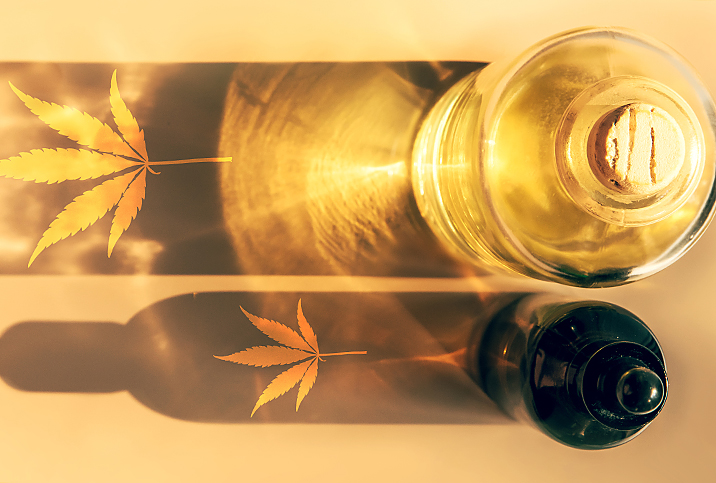Can CBD Combat Addiction?

Substance use disorders (SUD) have become some of the world's most prevalent public health crises. In 2019, a reported 70,630 people died of overdoses in the United States, according to the Centers for Disease Control and Prevention (CDC), including a large percentage from prescription opioids.
As SUDs are complex, in terms of their causes and effects, most patients benefit from a multipronged treatment approach. Research indicates CBD may be one valuable and multifaceted tool.
Zuhayr Adia, M.D., a London-based National Health Service (NHS) doctor and founder of Neuraleaf, said there are two types of addiction: psychological and physical. He and other doctors believe CBD may help with both aspects by reducing dependency, assuaging withdrawal symptoms and decreasing the risk of relapse.
"We're currently going through what some deem as a psychedelic renaissance, and psychedelic drugs such as psilocybin mushrooms (magic mushrooms), lysergic acid diethylamide (LSD) and cannabis—which is still debated as to whether it is a hallucinogen or not—are being coined as the next breakthrough drugs in order to defeat alcohol and opiate addictions," said Alexander Lapa, M.D., a psychiatrist at Ocean Recovery Center. "Cannabis, or more particularly the chemical cannabidiol, has received plenty of attention for a number of reported benefits."
What is CBD?
CBD is one of more than 100 cannabinoids in the cannabis plant.
Unlike its relative, tetrahydrocannabinol (THC), CBD doesn't get you high. In fact, CBD can reduce the psychoactive effects of THC and safeguard the brain from the adverse effects of cannabis.
"CBD is absolutely nonpsychoactive, which means that even at extremely high doses, it is not even slightly intoxicating," Adia said. "It is legal to consume and drive, for example. CBD has actually been shown to be effective in treating cannabis addiction."
CBD also has various medicinal properties and has been used in an effort to assuage conditions such as chronic pain, PTSD, anxiety, Parkinson's disease, multiple sclerosis, Crohn's disease and epilepsy.
Currently, there is one FDA-approved prescription CBD medication, Epidiolex, used to treat two forms of rare, aggressive and treatment-resistant childhood epilepsy.
How does CBD work?
Phytocannabinoids (cannabinoids from plants) work with the endocannabinoid system (ECS, referring to cannabinoids produced in the body), a vast network of endocannabinoids, receptors and enzymes. The ECS is responsible for maintaining homeostasis, or balance, in several bodily systems and plays a role in functions such as sleep, mood, memory, pain, appetite and pain sensation.
CBD and its fellow phytocannabinoids mimic the body's endocannabinoids and bind with cannabinoid receptors to improve the ECS's function.
Using CBD to reduce dependency
Perhaps the most powerful way CBD may be used to combat SUD is by preventing it from occurring at all. Because of its anti-inflammatory and analgesic properties, CBD may reduce pain and potentially decrease a person's need for prescription painkillers, including highly addictive opioids.
According to the U.S. Department of Health and Human Services, in 2018, two in three drug overdose deaths involved opioids. In 2019, about 9.7 million people ages 12 and older misused prescription opioids—745,000 used heroin.
CBD may help with both aspects by reducing dependency, assuaging withdrawal symptoms and decreasing the risk of relapse.
Martin A. Lee, director of Project CBD, a California-based nonprofit dedicated to cannabis research and education, noted CBD and THC can also potentiate opioids, or make them more effective. This may reduce the amount of medication necessary for treatment, and therefore reduce the risk for dependency and overdose.
CBD and physical symptoms
CBD's potential to assuage physical symptoms may help patients weather withdrawals and recover from long-term side effects of substance use, including chronic inflammation and neurodegeneration.
Adia cited a 2011 study published in the Journal of Psychopharmacology indicating that CBD can relieve anxiety. A large case series published in The Permanente Journal in 2019 demonstrated CBD may improve sleep latency and quality. According to Adia, both sleeplessness and anxiety are common symptoms of SUD and withdrawals from various substances, from nicotine to opioids.
Research shows CBD can also reduce inflammation, another side effect of SUD. While some inflammation is healthy as part of the body's immune response, excessive chronic inflammation can have serious consequences.
Adia explained symptoms of excessive inflammation can include a general feeling of weakness, unwellness and depression, as well as digestive disruptions such as loss of appetite, nausea and diarrhea, symptoms that may last for several days. Over time, chronic inflammation can contribute to more significant problems, including ulcerative colitis, Crohn's disease, arthritis, diabetes and certain cancers.
Inflammation may also contribute to diminishing neurogenesis in the hippocampus region of the brain. According to Lee, this is a double-edged sword, as hippocampal damage is associated with increased depression and substance abuse risk.
Fortunately, he said, CBD's neuroregenerative properties, along with its anti-inflammatory attributes, may promote healing and reverse hippocampal deficits. Likewise, it may rectify depletions in the ECS caused by chronic alcohol abuse.
CBD and psychological symptoms
"The psychological side of addiction is much more widespread among all substances and is much more difficult to treat," Adia said. "Psychological cravings and addiction arise from the dopamine pathways in the prefrontal and limbic parts of the brain.
"Dopamine is the 'motivation and reward' chemical in our brains, which is hijacked by these substances," he continued. "Our brain gets used to this level of dopamine, and when the substance, whatever it is, is withdrawn, dopamine drops, and psychological symptoms and cravings begin. It takes much longer to be cured of a psychological addiction than a physical addiction."
According to Adia, doctors do not agree on how addiction works in the brain or how CBD relieves addiction.
"What we do know is that CBD works on the dopamine pathways to mediate addiction. CBD was shown to reduce heroin cravings in those with opioid use disorder, and also was shown to prevent and reduce opioid dependency."
CBD also has been used in an effort to assuage conditions such as chronic pain, PTSD, anxiety, Parkinson's disease, multiple sclerosis, Crohn's disease and epilepsy.
Lapa and Adia referred to Yasmin Hurd's study, published in 2019 in The American Journal of Psychiatry, which demonstrated that CBD reduced the number of cravings and anxiety related to substance use in those recovering from opioid use disorder exposed to visual triggers.
"This was quite a remarkable study that showed CBD reduced the levels of anxiety and cortisol," Lapa said.
"One of the most difficult things is when your environment is constantly teasing you, making you crave more," Lee said. In addition to Hurd's study, Lee noted subsequent animal studies indicated CBD can reduce the risk of cue-induced relapse to "break that addictive cycle."
Lapa noted CBD's potential to alleviate withdrawal symptoms may also decrease the risk of relapse, as these challenges can ultimately cause the relapse to occur.
What to know before trying CBD
Before trying CBD for substance use disorder or any other purpose, talk to your doctor.
The World Health Organization and various studies have concluded CBD is safe and generally well tolerated, with a very low risk of serious side effects or dependency. The source of your CBD is also important to verify to minimize the risk of contaminants or other active ingredients.
However, while uncommon, drug interactions and other adverse reactions can occur.
Adia said adverse reactions are most common with low-grade CBD products containing chemical additives or even alcohol. Certain drugs, including blood thinners, may interact negatively with CBD as well.
It's also important to note CBD is not a silver bullet, Lapa said, explaining recovery typically requires multiple tactics, including therapies and lifestyle changes that equip patients with the skills they need to maintain abstinence and achieve well-being for the long haul.
"As humans, we're always seeking a quick-fix solution to modern-day problems, like addiction. Recovery from addiction is a very hard process, and with it comes a lot of self-determination, resilience and discipline," Lapa said.

















